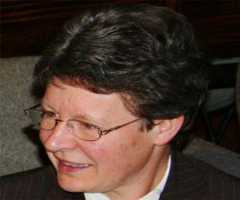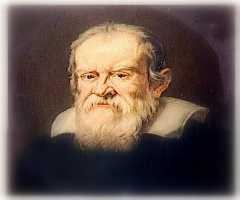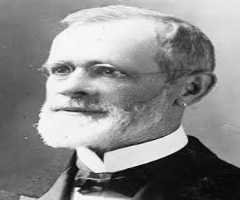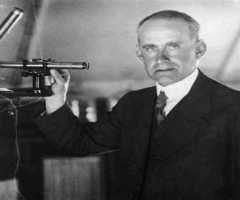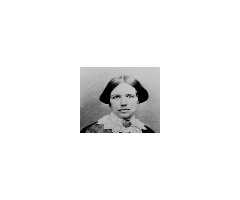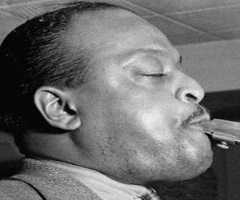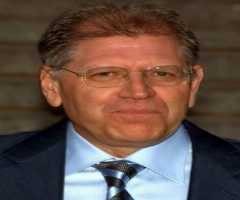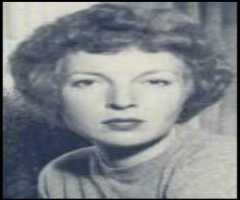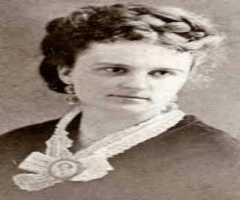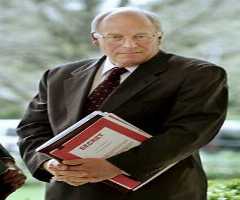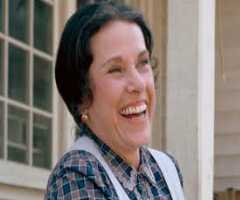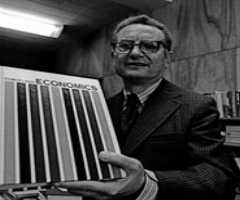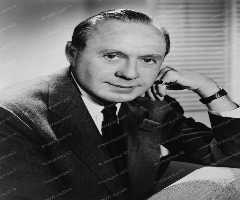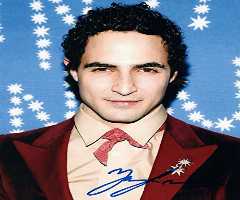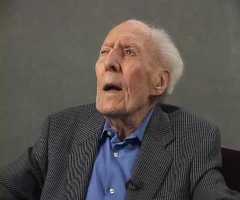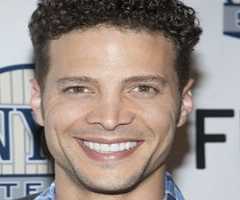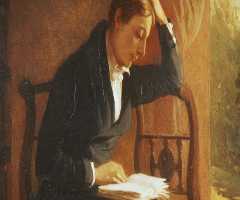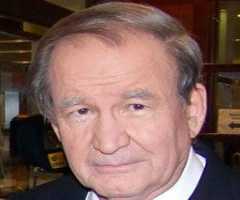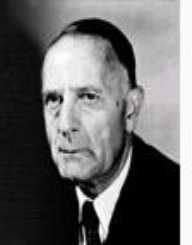
Birth Place : Marshfield, Missouri, United States of America
Died On : September 28, 1953
Zodiac Sign : Scorpio
Edwin Powell Hubble Biography, Life, Interesting Facts
Edwin Powell Hubble was one of the prominent American astronomers and was an important figure in world’s astronomy. Born on November 20, 1889, Edwin Powell Hubble was a vital role in establishing the field of extragalactic astronomy and observational cosmology. Regarded as one of the most important astronomers of all time, he coined the Edwin Powell Hubble law that suggests the universe is expanding. The law states that the earth and recessional velocity of a galaxy keep increasing its distance. Edwin Powell Hubble was able to prove that the “Nebulae,” which are objects previously believed, as clouds of dust were galaxies beyond the Milky Way. The American astronomer, Vesto Slipher had previously discovered that most of the lights from these nebulae was strongly red-shifted, indicative of high recession velocities.
Edwin Powell Hubble also worked with the US Army at the Aberdeen Proving Ground in Maryland as the Chief of the External Ballistics Branch of the Ballistics Research Laboratory during World War II. His effective work at the time led to an improvement in the design, performance and military effectiveness of bombs and rockets. The Hubble Space Telescope is named in his honor and a model of it is being displayed in his hometown, Marshfield, Missouri.
Early Life And Education
Edwin Powell Hubble was born on November 20, 1889, in Marshfield, Missouri to Virginia Lee Hubble and John Powell Hubble. In 1900, the family moved to Wheaton, Illinois. Growing up, Edwin Powell Hubble for notable for his involvement in sports and played football, basketball, baseball and did well in track events. His involvement in sporting activities at the time was superior to that of his academics both in high school and in college. Edwin Powell Hubble enrolled at the University of Chicago to study law and graduated with a Bachelor of Science degree in 1910. While there, Edwin Powell Hubble participated in sports and led the school’s basketball team to win its maiden conference title in 1907.
Edwin Powell Hubble was a member of the Kappa Sigma Fraternity. He later enrolled at The Queen’s College, Oxford for his master’s degree where Edwin Powell Hubble studied jurisprudence and late literature and Spanish. In 1909, the family moved from Chicago to Shelbyville, Kentucky and finally settled in Louisville. After the death of his father in 1913, Edwin Powell Hubble returned from England to cater for the family.
Career
After studying law to honor his father’s dying wish, Edwin Powell Hubble was not motivated to practice the profession but rather found solace in teaching physics and mathematics at New Albany High School. He also served as the coach of the school’s basketball team. Edwin Powell Hubble, within a year of teaching, studied astronomy at the Yerkes Observatory of the University of Chicago with the help of a former professor at the University. In 1917, Edwin Powell Hubble received his Ph.D. with his dissertation "Photographic Investigations of Faint Nebulae." After completing his dissertation, Edwin Powell Hubble joined the United States Army in its war against Germany in the World War I, in 1917.
He served in the 2nd Battalion, 343 Infantry Regiment of the 86th Division. Though the 86th Division were never in combat, Edwin Powell Hubble attained the rank of lieutenant colonel. Hubble spent a year in Cambridge to continue his studies of Astronomy after the war. George Ellery Halle then employed him at the Carnegie Institution’s Mount Wilson Observatory, California in 1919 where Edwin Powell Hubble would work until his death in 1953. Aside from working at the Observatory, Edwin Powell Hubble also worked for the US Army as the Chief of the External Ballistics Branch of the Ballistics Research Laboratory at Aberdeen Proving Ground in Maryland during World War II.
He commissioned the research into exterior ballistics that increased the effective firepower of bombs and projectiles. Edwin Powell Hubble personally developed some of the equipment for the exterior ballistics including the high-speed clock camera, which helped in the study of the characteristics of bombs and low-velocity projectiles in flight. His worked there improved the design, performance and military effectiveness of bombs and rockets. He was awarded the Legion of Merit for his work there.
Discoveries
After the service in the army, Edwin Powell Hubble worked at the Mount Wilson Observatory in 1919, and that was, just the period the 100-inc Hooker Telescope, which was then the worlds largest was completed. The general notion at the time was that the entire universe consisted of Milky Way Galaxy. Between 1922 and 1923, Edwin Powell Hubble used the telescope to identify Cepheid variables in several spiral nebulae including the Triangulum, Andromeda, and Nebula. Edwin Powell Hubble, therefore, concluded that the nebulae where entire galaxies on their own since they were too distant to be among the Milky Way. His idea was opposed by the likes of Harlow Shapley of the University of Harvard and others in the astronomy establishment at the time.
However, on November 23, 1924, Edwin Powell Hubble had his findings published The New York Time. On January 1, 1925, Edwin Powell Hubble presented it in the form of a paper at the meeting of the American Astronomical Society. This finding went a long way to change the scientific view of the universe. Edwin Powell Hubble also originated the Hubble sequence, which is a system for classifying galaxies and grouping them as they appear in photographic images. His later work also led to the Hubble’s law, which is the linear relation of the distance between the galaxies and its redshift. Per the law, it means the greater the distance between any two galaxies, the greater their relative speed of separation. In August 1935, he discovered the asteroid 1373 Cincinnati and within that period came out with The Observational Approach to Cosmology and The Realm of the Nebulae.
Personal Life
Edwin Powell Hubble was married to Grace Hubble. He had some health issues during the latter part of his life and suffered a heart attack in July 1949 during a vacation in Colorado. He died on September 28, 1953, of cerebral thrombosis in San Marino, California. There was no funeral for him, and his wife was secretive about his burial site.
Awards
Edwin Powell Hubble has received several awards, including the Newcomb Cleveland Prize, 1924, Bruce Medals, 1938, Franklin Medal, 1939, Gold Medal of the Royal Astronomical Society, 1940 and the Legion of Merit for outstanding contribution to ballistic research in 1946. He is being named after the Asteroid 2069 Hubble, Orbiting Hubble Space Telescope and also inducted into the Indiana Basketball Hall of Fame in 2017 among several others.
More Astronomers
-
![Nicolaus Copernicus]()
Nicolaus Copernicus
-
![Jocelyn Bell Burnell]()
Jocelyn Bell Burnell
-
![Galileo Galilei]()
Galileo Galilei
-
![Cleveland Abbe]()
Cleveland Abbe
-
![Arthur Eddington]()
Arthur Eddington
-
![Maria Mitchell]()
Maria Mitchell
More People From Missouri
More People From United States of America
-
![Stephen Douglas]()
Stephen Douglas
-
![Katherine Macgregor]()
Katherine Macgregor
-
![Jack Finnegan Gilinsky]()
Jack Finnegan Gilinsky
-
![Paul Samuelson]()
Paul Samuelson
-
![Jack Benny]()
Jack Benny
-
![Matthew Gray Gubler]()
Matthew Gray Gubler

